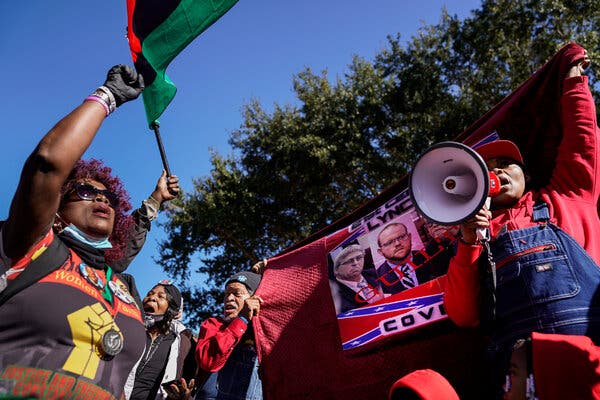U.S. Reacts to Guilty Verdict in Ahmaud Arbery Murder Case
From the moment the first guilty verdict was uttered inside a Georgia courtroom, a cascade of tears and shouts of vindication coursed across the country. Black parents called their children, weeping. Activists choked up, embracing what they called a rare instance of justice.In a country whose cavernous divides over race, guns and vigilante violence have been on display recently in courtrooms from Kenosha, Wis., to Charlottesville, Va., to Brunswick, Ga., the guilty verdicts on Wednesday against three white men who pursued and killed Ahmaud Arbery were hailed by political leaders and many Americans across the political spectrum.Gov. Brian Kemp of Georgia, a Republican, said he hoped the verdicts would help the country “move forward down a path of healing and reconciliation.” President Biden said the verdict showed the “justice system is doing its job,” but said Mr. Arbery’s murder and the chilling videotape that recorded it were a measure of the country’s persistent racial inequities.Supporters of Ahmaud Arbery hold a sign referring to the killing as a 21st-century lynching.Nicole Craine for The New York TimesThe widespread exclamations of support for the jury’s verdict over what some activists called a 21st-century lynching stood in stark contrast to the deeply polarized response to the acquittal of Kyle Rittenhouse, the white 18-year-old who fatally shot two people during the unrest in Kenosha following the police shooting of a Black man last year.Many conservatives embraced Mr. Rittenhouse’s acquittal last week as a victory for self-defense and gun rights while liberals worried it would encourage armed vigilantism as a response to racial justice protests.“The Kyle Rittenhouse verdict is the America I expect — the Arbery verdict is the America I fight for,” said the Rev. Lenny Duncan, 43, a Black pastor in Portland, Ore., who attended many of the demonstrations that roiled the city last year after the killing of George Floyd, Breonna Taylor and other Black Americans.The conviction of all three defendants charged in Mr. Arbery’s February 2020 killing — Travis McMichael, 35; his father, Gregory McMichael, 65; and their neighbor William Bryan, 52 — drew few rebukes or protests.The lawyers for Travis McMichael told reporters that they respected the jury’s decision but planned to appeal the verdict, which they described as “disappointing and sad.”“This is a very difficult day for Travis McMichael and Greg McMichael,” Jason Sheffield, one of the lawyers, said, adding that both of them “honestly believe what they were doing was the right thing to do.”The men also face federal hate crimes charges and are expected to stand trial on them in February.William Bryan stands next to his attorney, Kevin Gough, after the jury handed down its verdict.Stephen B. Morton/Associated PressThe verdict came as a relief to some Black Americans who had watched the trial with sadness and dread. Many had urgently hoped for a guilty verdict, but worried that the overwhelmingly white jury would side with defense lawyers who portrayed the three white defendants as neighbors worried about a rash of crimes in their neighborhood when they took off in pursuit of Mr. Arbery as he ran in the street.“Thank God for this verdict today,” said Warren Stewart Jr., a Black clergyman and political activist in Phoenix. “I started calling a few friends and they’re crying on the phone. It’s bittersweet. Having two Black sons, this is scary. This is real life for us.”Mr. Stewart’s 18-year-old son, Micaiah, had been paying rapt attention to the trial, and the family tried to balance its hopes and prayers for a guilty verdict against a long history of high-profile killings of Black men and women that have been declared justified by the legal system.“It happens too often, that they get away with it,” Micaiah Stewart said. He said Mr. Arbery’s killing on a public street seemed to confirm his own fears of simply going outside as a young Black man in the United States.Some Black Americans said the trial had posed a make-or-break test for their frayed trust in the legal system. They said the video showing how an unarmed Black man had been chased, cornered and shot had left little room for doubt in their minds that Mr. Arbery’s death was murder.“We look forward to the day when it’s not a question when a person is lynched by a racist that it is murder,” said Hawk Newsome, the co-founder of Black Lives Matter Greater New York, who called the guilty verdicts a “partial victory.”Mr. Newsome said the convictions in Mr. Arbery’s killing juxtaposed against Mr. Rittenhouse’s acquittal in the shooting of three white men protesting the police shooting of a Black man added up to a “mixed message.”“You can’t outright chase down and murder Black people and those who support them,” he said. “But if you make it look like self-defense, you got a shot.”In Atlanta, Chris Stewart, a lawyer who has represented several families of Black people killed by white police officers, fought back tears as he reflected on the verdict in Georgia.The Rev. Al Sharpton speaks to the press outside of the Glynn County Courthouse.Nicole Craine for The New York Times“It’s good to see racism lose,” said Mr. Stewart, whose clients have included the family of Walter Scott, a 50-year-old Black man shot in the back in 2015 by a South Carolina police officer. “This case will be remembered for many years. You can’t overstate how big this is.”Understand the Killing of Ahmaud ArberyCard 1 of 5The shooting.

